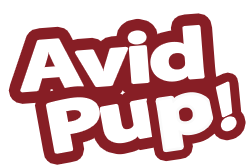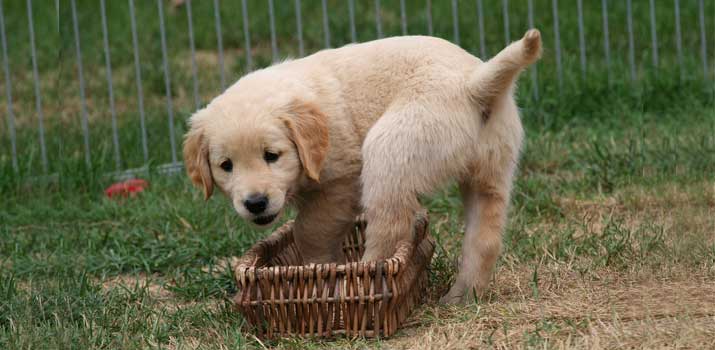
Raising a Golden Retriever puppy can be a very rewarding experience. These dogs are one of the most beloved breeds in the world. Spend a few minutes with an energetic puppy and it’s not hard to see why. Golden Retriever puppies are full of energy and ready to explore the world around them.
Before you know it, your little puppy will be a full-fledged adult that weighs upwards of 75 pounds!
Aside from proper training and love, the most important thing you can give your new puppy is a healthy diet.
What you choose to feed your young pup now can affect their overall health as an adult.
Golden Retrievers are not immune to diseases and health issues. In fact, the breed is at risk for musculoskeletal problems, cancer, heart disease, and much more.
While those are things that no owner wants to hear, it’s important to understand how crucial a good diet is for your growing puppy.
By sticking to a high-quality puppy food that’s formulated for the breed’s needs, you can address potential issues early on and set your dog up for a healthy life ahead.
Commercial dog food has come a long way in the last decade. A growing number of manufacturers are starting to produce healthy food options that can benefit puppies as soon as they’re able to wean off their mother’s milk.
To help you on your search for that perfect formula, here’s a list of some of the best puppy food options for Golden Retrievers on the market.
7 of the Best Dog Foods for Golden Retriever Pupppies
1. Hill’s Science Large Breed Puppy Diet, Chicken Meal & Oats Recipe
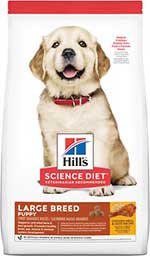
This Hill’s Science dog food is made for large breeds. It even has a Golden Retriever puppy on the packaging. The formula contains beneficial ingredients.
Approximately 26 percent of the food is made of protein. Most of it comes from chicken meal. It also flaxseed and fish oil for a healthy dose of omega fatty acids.
The food has acceptable levels of calcium and phosphorus as well for proper bone development.
Some additional ingredients you’ll find in this food include apples, carrots, cranberries, and peas. These plant-based ingredients provide vitamins, minerals, and antioxidants.
To support your puppy’s joints as they grow, there’s also glucosamine and chondroitin. What you won’t find are artificial preservatives, chemical flavors, or synthetic coloring.
2. Instinct by Nature’s Variety Raw Boost Grain-Free Recipe
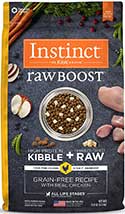
If you want to start your puppy off on food that they can continue to eat as an adult, the Raw Boost formula from Instinct is a good option. It’s designed to support your dog’s health at all life stages.
With an impressive protein content of 37 percent, this food has all your dog needs to develop strong muscles. The protein comes from chicken, chicken meal, fish meal, and more.
What’s unique about this food is that it contains small morsels of freeze-dried raw meat. The recipe also contains a slew of great extras.
For digestive health, there’s a dose of prebiotics. To help their immune system, antioxidants are thrown in with blueberries. Finally, to support their heart health and coat, there’s salmon oil.
3. Royal Canin Golden Retriever Puppy Dry Dog Food
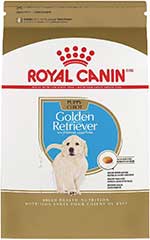
This Royal Canin dog food is made solely for Golden Retriever puppies. It can support their growth to 15 months of age.
It has 27 percent protein, 14 percent fat, and appropriate amounts of calcium and phosphorus. As a supplement for their joints, glucosamine and chondroitin are also added to the mix.
Royal Canin also considered the mechanics of chewing.
Many young pups have a hard time eating dry food after consuming only milk. The size and texture of the dry kibble are specially designed to promote chewing, which can be helpful during the teething stage.
4. Blue Buffalo Wilderness Large Breed Puppy Chicken Recipe

Blue Buffalo has made a name for itself by producing high-quality food for dogs of all sizes.
The large breed puppy food continues that legacy. The food contains an optimal blend of calcium and phosphorus.
It also has DHA, omega fatty acids, and a great antioxidant blend to support your pup’s overall health. This food has a very high protein content of 35 percent. It comes from deboned chicken, fish meal, and more.
When you pour a bowl for your furry friend, you’ll notice small pieces of dark food. These are the brand’s LifeSource Bits, which contain concentrated vitamins and minerals.
5. Diamond Naturals Large Breed Puppy Formula Dry Dog Food
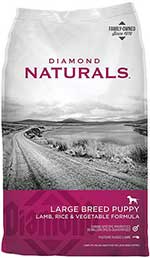
The large breed puppy food from Diamonds is focused on providing a natural and balanced diet.
At the top of the ingredient’s list is lamb. In total, protein makes up about 27 percent of the recipe.
A collection of fruits and vegetables are added as well. There’s pumpkin, blueberries, spinach, coconuts, carrots, and so much more. All of these ingredients help to provide your dog with all the vitamins and minerals they need to stay healthy.
To improve digestive health, natural prebiotics is also added.
Complex carbs like peas and garbanzo beans ensure that your dog has a healthy supply of energy to last them throughout the day.
Wet Canned Food for Golden Retrievers
Royal Canin Golden Retriever Loaf in Sauce Canned Dog Food

This canned food is great for mixing with dry kibble. While it is designed for adult Golden Retrievers, the ingredients found within a can of this food can benefit your pup when added to puppy kibble.
It has a protein content of about 6.3 percent. Some of that percentage comes from nutrient-rich pork liver. Like Royal Canin’s dry food, this recipe also contains glucosamine and chondroitin for joint support.
The food comes in the form of a loaf that’s soaked in a tasty sauce.
The added moisture and strong flavors can get even the most stubborn puppy to eat their meal.
Merrick Chunky Grain-Free Big Texas Steak Tips Dinner Canned Dog Food

From Merrick is this grain-free canned food. If your puppy suffers from allergies, the simple ingredients list of this product may help them get relief. Its main ingredient is deboned beef.
The food contains visible chunks of meat that your puppy will love. The beef is complemented by beef liver and beef broth. In total, protein makes up 8 percent of the recipe.
The food also has peas as a source of vitamins and salmon oil for omega fatty acids.
There are no artificial flavors, colors, or preservatives. It’s also free of potential allergens like corn, wheat, and soy.
The Importance of Specialty Recipes
One of the biggest mistakes new owners make is providing their puppy with standard adult formulas.
While your Goldie will surely have no problem gobbling up any food you put in front of them, you may notice the consequences later on.
Puppy formulas are specifically formulated to meet the needs of growing dogs.
Despite their small size, Golden Retriever puppies need to eat significantly more calories than their adult counterparts. Furthermore, they have unique nutritional requirements that need to be met.
Puppies go through a rapid growth spurt during their first year of life.
At about 16 weeks, most Golden Retrievers weigh approximately 30 pounds. By their first birthday, they will be close to their full adult weight of up to 75 pounds.
That fast development cycle requires a lot of fuel and a healthy diet filled with vitamins, nutrients, and minerals.
Most puppy foods are packed with all the essentials. They typically contain more calories per bite as well, allowing your dog to gain healthy weight without becoming obese.
Large Breed Formulas
In addition to getting a dog food product that’s made for puppies, you need to make sure that your Goldie is eating food that’s formulated for large breeds.
The nutritional needs of a Golden Retriever are vastly different than that of a Dachshund or Pomeranian.
The large size of an adult Golden Retriever puts them at risk for many skeletal issues. The breed is known to suffer from hip dysplasia, arthritis, and skeletal deformities.
The best way to reduce your dog’s chances of experiencing these problems is to manage its growth closely.
If your dog eats a poor diet that leads to weight gain, they are at high risk of going through developmental issues. On the other hand, nutritional deficiencies can do the same thing. It’s a fine balance that you need to stay on top of.
Luckily, many specialty dog foods take care of all the hard work for you.
Not only do they address the nutritional needs of puppies as a whole, but they can accommodate the unique requirements of large breeds.
Reputable manufacturers follow guidelines set by the Association of American Feed Control Officials, or AAFCO.
An AAFCO seal of approval means that the product has everything your pup needs to support their growth.
How Much Food Do Golden Retriever Puppies Need?

Determining how much to feed your puppy is just as important as what you feed them. All food products are different, so there’s no exact caloric amount that works across the board.
Furthermore, the number of calories your pup will need can change weekly as they gain weight.
The best way to keep track of your dog’s diet is to consult with your vet regularly about their development.
Generally, puppies will need to eat several times throughout the day. Their caloric intake should be spread out evenly between four meals a day.
As time progresses, you can decrease the frequency of their meals until they reach adulthood.
While there’s no exact science to determine the amount of food you need, many seasoned breeders will use a simple feeding schedule that changes as their pup gets bigger.
Once your dog has weaned off their mother, you can start out with about a cup and half of food per day. This should be split among four meals every few hours.
For every month thereafter, add half a cup of food to their daily allotment. At the six month mark, you should be feeding approximately three to four cups of food.
During this schedule, keep a watchful eye on your pup’s weight. Golden Retrievers are notorious for gaining weight. If you sense that your pup is packing on the pounds too quickly, ease off on the food and consult with your vet for guidance.
Nutritional Requirements for Golden Retriever Puppies
Before you settle on dog food for your Golden Retriever pup, take a close look at the ingredient’s list. While there are plenty of great options on the market, there are even more bad ones.
Keep the following things in mind during your search.
Protein
Like any other dog breed, protein is the most important thing your pup needs to thrive. Protein helps to build and support the muscles.
Generally, adult dogs do well with a diet that consists of about 18 percent protein.
Puppies, on the other hand, need at least 22 percent. To ensure that your dog grows up to be strong and active, you can even go higher than that.
The quality of the protein source matters as well.
Cheaper dog foods will use byproducts and fillers. These should be avoided as much as possible. High-quality meat sources like chicken, turkey, beef, and fish are always preferred.
The protein source should be the first thing listed on the ingredient’s list. It should be an identifiable meat or meat meal. If it’s anything else, consider going with something else.
Calcium and Phosphorus
Calcium and phosphorus play an important role in how your dog’s bones develop. The inclusion of these minerals is one of the biggest differences between an adult formula and puppy one.
While they can be found in adult recipes, how much of it that’s used is very different for puppy foods.
The AAFCO guidelines state that large breed puppies, like the Golden Retriever, need to have between 2.5 and 4 grams of phosphorus per 1,000 calories.
When it comes to calcium, the AAFCO determined that large breed puppies need between 2 and 4.5 grams.
Puppy formulas also use a specific ratio to ensure that the two minerals are balanced. Most reputable puppy products have a calcium-to-phosphorus ratio of around 1:1.2.
Omega Fatty Acids
Omega fatty acids come from ingredients like fish oil and flaxseed oil. In addition to adding plenty of great flavor to the food, these ingredients are known to benefit dogs inside and out.
Internally, omega fatty acids can help to improve cardiovascular health.
With Golden Retrievers being at risk for heart disease, it’s a good idea to introduce this ingredient early on.
They can also help to improve your dog’s skin and coat.
The breed’s most identifiable trait is their shiny golden coat, so you’ll want to ensure that their skin stays moisturized and supple.
Your puppy should eat food that’s made up of about 8 percent of healthy fats.
Antioxidants
Approximately 60 percent of Golden Retrievers are diagnosed with cancer.
This alarming figure is a relatively new development in the breed’s history and many studies are being done to figure out why the disease is so common.
You can do your part to help decrease those chances for your dog by giving them an antioxidant-rich diet.
Antioxidants can come from fruits like blueberries, cranberries, and more. They help to improve your dog’s overall immunity by protecting cells and fighting off free radicals.
Filler-Free Ingredients
Another health issue that’s prevalent among this breed is allergies.
Many Golden Retrievers don’t react well to corn, soy, artificial preservatives, and many other fillers. Allergies can affect your pup in several ways.
They can experience gastrointestinal problems, hair loss, and rashes.
To avoid these issues, steer clear of unnecessary fillers. Cheap fillers are used to decrease production costs. Unfortunately, they can do more harm than good in terms of health.
Not only can they cause allergic reactions, but they’re difficult to digest and hold very little nutritional value. Instead of corn, wheat, and soy, go with dog foods that contain complex carbohydrates like sweet potatoes, pumpkins, and oats.
Joint Support
Due to their large size, joint problems arise more often than not. Arthritis is very common in the breed. In more severe cases,
Golden Retrievers can also suffer from hip or elbow dysplasia. To keep their joints in good condition, go with dog food that has glucosamine and chondroitin.
These supplements help to develop and maintain the cartilage in the joints. While your puppy is still very young, the supplements can help to prevent unwanted stress on the joints and decrease the chances of injury.
Conclusion
Keeping your precious pup well-fed with high-quality food should be your top priority as a dog owner. Many aspects of your canine companion’s health start with their food.
By investing in food that’s balanced and nutrient-rich, you can rest easy knowing that they have all that they need to grow up without any major problems.
Also Read: Best Low Sodium Dog Food Brands

